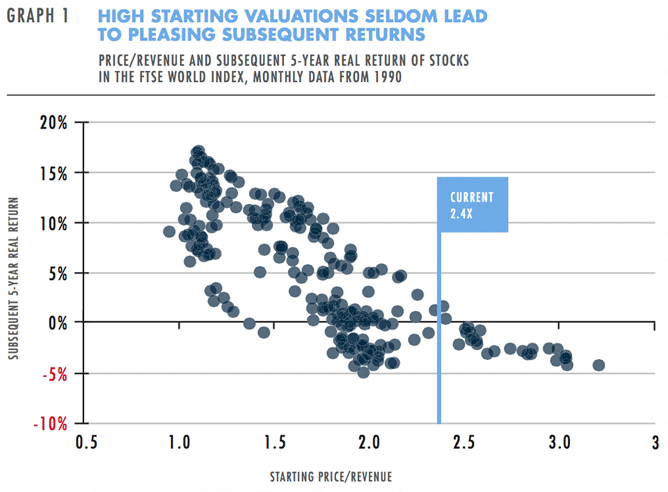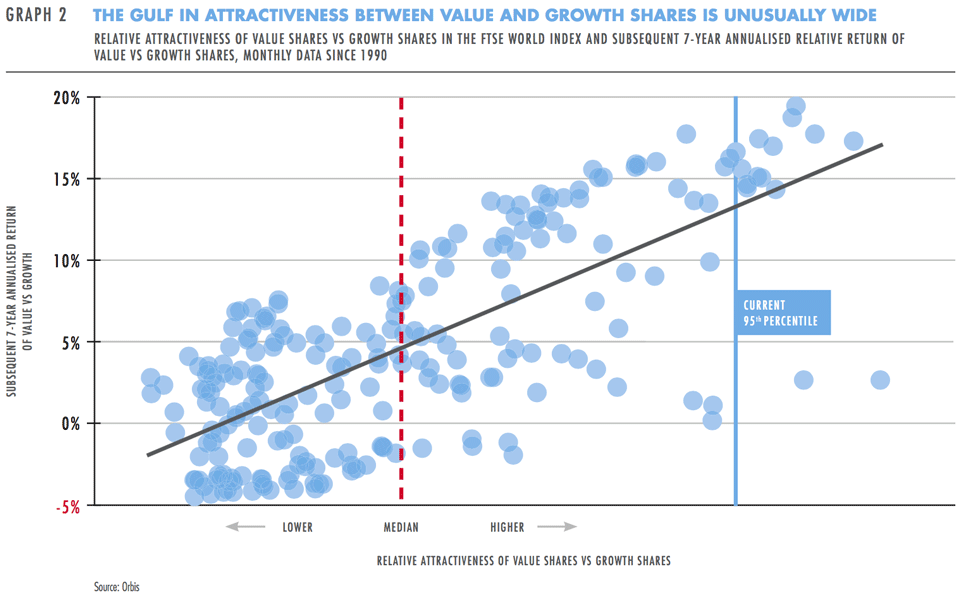The loser’s game isn’t especially fun to play, but it is a winning strategy for those who have the discipline and the patience for it. William Gray, from our offshore partner Orbis, explains why the same goes for investing.
Many think of investing as the pursuit of winning investments. I prefer to think of it as controlled aggression: acting with conviction while trying to avoid big mistakes, much as Charles Ellis explained more than 40 years ago in a Financial Analysts’ Journal article entitled ‘The Loser’s Game’. He cited the work of Dr. Simon Ramo, an engineer who examined the game of amateur tennis and found that about 80% of points are decided by mistakes rather than skilled shot-making. As a result, a player’s best strategy is not to try to win by hitting winners but instead to avoid mistakes and let their opponents lose by making more of them.
A sobering pattern
Moving beyond the analogy, the ability to avoid losers is particularly important when investors seek to produce positive inflation-adjusted returns amid high starting valuations. That is illustrated well in Graph 1. Each dot shows the subsequent five-year real return that investors realised when the FTSE World Index began at the starting valuation shown in the horizontal axis.

The pattern is sobering: whenever the index has started at a valuation higher than 2.4 times revenue — its current level — it has only rarely produced positive real returns over the ensuing five-year period. Of course, it could be different this time or prices could simply go higher — indeed there are some points to the right of the light blue line — but it is unlikely that a passive strategy which simply captures the average stock at the average valuation can provide investors with a fighting chance to overcome this headwind.
In recent years, as some sectors of the market have trended higher and higher, our efforts to avoid making mistakes have created a meaningful drag on our performance, as we have discussed in previous commentaries. This has been true, for example, of companies with stable earnings in developed markets, which are at a relative peak. From this point we are especially enthusiastic about the ability of the Orbis Global Equity Fund (the Fund) to outperform in future as a result of the larger-than-normal disparity in valuations within global stock markets. Put another way, we believe the reward for skillfully avoiding losers has increased as the dispersion of likely future returns has widened.
The value-growth gap
The horizontal axis on Graph 2 shows a measure of the spread between the prospective return of so-called ‘growth’ and ‘value’ shares as measured by a relatively simple proprietary model. The vertical axis shows the subsequent seven-year annualised total return of value versus growth shares. The regular dispersion of the dataset around the straight diagonal line shows that there is a pretty strong, albeit imperfect, relationship between prospective return dispersions and subsequent realised returns. It also shows that at today’s current value-growth gap, the opportunity to add value by avoiding some shares in favour of others is meaningfully higher than average, although by no means certain. On very rare occasions the market presents investors with an opportunity to play both a ‘loser’s game’ and a ‘winner’s game’ at the same time, thereby presenting extraordinary opportunity. The best example of this in the Fund’s history was in the year 2000 at the peak of the technology, media and telecommunications (TMT) boom. We were presented not only with the opportunity to play a loser’s game by avoiding the mistake of owning technology shares with extraordinarily low prospective returns, but also playing a winner’s game by investing very heavily in shares of excellent businesses with extremely compelling prospective returns and very little risk of permanent capital loss. The results produced were extraordinary, though not before we looked foolish for a painfully long period of time leading up to that peak in 2000.

“THE ABILITY TO AVOID LOSERS IS PARTICULARLY IMPORTANT WHEN INVESTORS SEEK TO PRODUCE POSITIVE INFLATION-ADJUSTED RETURNS AMID HIGH STARTING VALUATIONS”
No winner’s game in sight
Today we find ourselves in a similarly embarrassing position of looking foolish for a painfully long time as a result of not owning an increasingly narrow group of market leaders. But unlike the late 1990s, we do not see the opportunity to invest in a group of attractive laggards with high prospective returns and low risk of permanent capital loss. Some areas of the market such as precious metals, energy and other commodity-related shares have indeed fallen sharply and are deeply out of favour. As such, these areas are more likely than not to produce attractive returns, but in our opinion, the risk of a permanent loss of capital in those shares is also meaningful, even at today’s valuations. That’s because their intrinsic value is ultimately determined by a single variable — the commodity price — that is outside the control of management and inherently unpredictable.
In addition, management incentives often lead to value-destructive behaviour through the cycle. In our view, these shares’ prices are mostly driven by speculative rather than fundamental forces and their aggregate position size should therefore be constrained within the portfolio. Make no mistake, if we again see the opportunity to hit a winner, we would take it just as we did during the TMT boom. We just don’t see it now.
Playing aggressively for winners today would involve taking much larger positions in the commodity/energy areas of the market mentioned above. For an investment management business that may well be the right thing to do given the financial incentives. But we see ourselves as pursuing a profession, and as stewards of your capital, and, for now, we prefer to focus on avoiding losers. While the opportunity set today is not as extreme as it was in the TMT era, the rewards available for simply avoiding losers appear to be well above average, and that’s a distinct and refreshing change from the situation over the past five years.